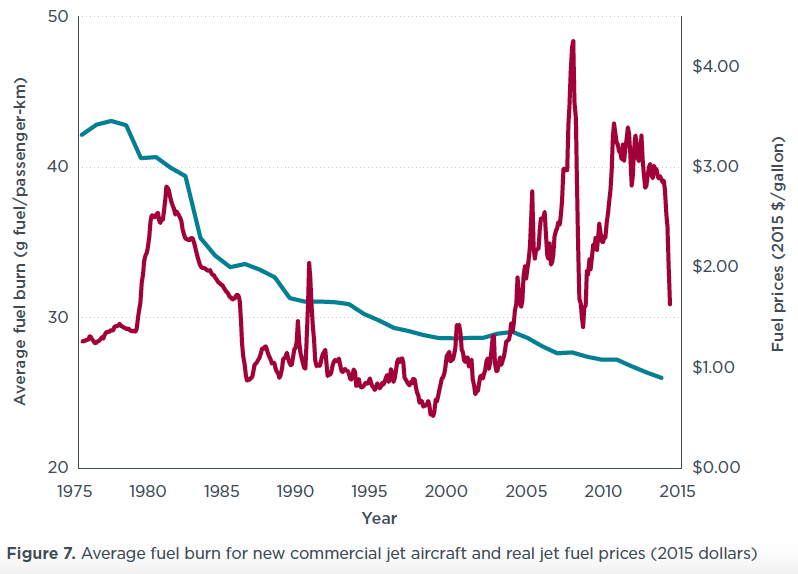
New plane fuel efficiency gains are more than a decade late for UN goal – study
Since 2010 the average fuel burn of new aircraft has improved by 1.1% per year, which suggests that aircraft manufacturers may miss UN aviation body ICAO’s 2020 fuel efficiency goals by 12 years, a new study by the International Council on Clean Transportation (ICCT) reveals.
Interested in this kind of news?
Receive them directly in your inbox. Delivered once a week.
As air traffic soars (industry trade body IATA forecasts a 4.1% annual growth for the next 20 years), this 1% progress in new commercial jet fuel efficiency falls way behind the technology advances needed to meet ICAO’s own targets, Transport & Environment commented.
Since 2009 (and after rejecting the idea in 2001) ICAO has been working on a CO2 standard for new aircraft to boost fuel efficiency technology in the fleet. Work should be completed in 2016, three years later than planned, with the standard for new commercial jets taking effect in 2020. Decisions on the actual stringency of the standard are due over the next months.
Andrew Murphy, sustainable aviation officer at T&E, said: “When demand for your service grows four times quicker than the fuel efficiency of new planes, you clearly have a CO2 emissions gap. This study confirms the open secret that planemakers are not delivering the efficient airplanes needed to meet UN goals. ICAO must help airlines meet their own climate goals and agree a CO2 standard that actually forces new technology in the fleet, rather than doing business as usual.”
The rate of fuel efficiency gains varied significantly over time: average fuel burn improved by 2.6% per year during the 80s, while no progress was seen during the 1970s and in the period from 1995 to 2005. As shown in the graph below, progress in fuel efficiency strongly correlates with fuel prices. That is, spikes in kerosene prices (like in early 80s and after 2004) have seen corresponding improvements in fuel efficiency of new jet planes.
“History has shown again and again that fuel efficiency in transport is highly linked to fuel costs. Air travel is no different. It’s a no brainer for ICAO to agree a global market-based measure that drives fuel prices up steadily over time,” Andrew Murphy added.
“With new aircraft having a lifespan of 20-30 years, falling efficiency returns could lock in unnecessary fossil fuel consumption for decades to come, greatly undermining global efforts to decarbonise and limit a temperature increase to under 2 degrees,” Andrew Murphy concluded.
If considered as a country, global aviation would have ranked seventh in terms of CO2 emissions in 2012, just after Germany. These already massive CO2 emissions rise every year and are projected to triple by 2050.